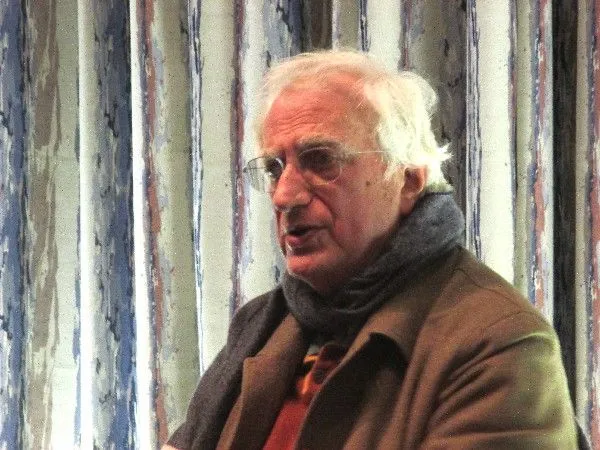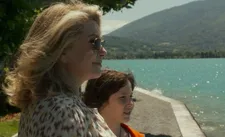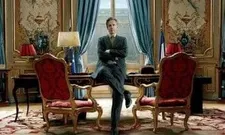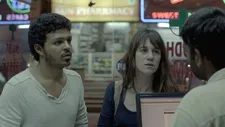 |
| Bertrand Tavernier on The French Minister (Quai d’Orsay): "I tell them not to play it as comedy and it will be funny." Photo: Anne-Katrin Titze |
The opening night of Rendez-Vous with French Cinema in New York at the Paris Theatre will bring us Catherine Deneuve's exceptional performance in Emmanuelle Bercot's On My Way. Bertrand Tavernier's wildly diplomatic The French Minister (Quai D’Orsay), based on Antonin Baudry’s graphic novels, starring Raphaël Personnaz, Thierry Lhermitte with Julie Gayet, Jane Birkin and Niels Arestrup closes the festival. Mathieu Amalric and Emmanuelle Devos in If You Don't, I Will (Arrête Ou Je Continue) directed by Sophie Fillières, Charlotte Gainsbourg and Yvan Attal in Michel Spinosa's His Wife (Son Épouse), Katell Quillévéré's Suzanne with Sara Forestier, François Damiens, Adèle Haenel and Paul Hamy are some of the other highlights of UniFrance and the Film Society of Lincoln Center's 19th edition running from March 6 - 16. Screenings and filmmaker appearances will take place at the Walter Reade Theater, Elinor Bunin Munroe Film Center, IFC, and BAMcinématek.
On My Way
 |
| On My Way |
Emmanuelle Bercot captures something real, fragile and brutal when Catherine Deneuve as Bettie takes us on the road in On My Way. Though the road is not made out of brick, Bettie's color is yellow from the opening credits to her golden Mercedes. At a darts tournament in a rural sports bar called Le Ranch, a group of women welcome her into their world for an evening which includes a younger man who convinces her to wear a huge pink curly clown's wig and spend the night with him. A soccer field early in the morning, cows looking on, a tractor in the fields, a autoroute rest stop restaurant, people who don't star in films, preoccupied and muddling through life, a friendly guard who lets her stay a rainy night on an ugly grey leather sofa in a country side furniture store - nothing really terrible happens, and yet, not enough to feed her soul. When she meets her grandson Charly (Nemo Schiffman) and agrees to drive him to his cryptic grandfather’s, the film changes direction, picks up speed, loses the car and eventually turns into a romantic comedy with barbecues in the garden, bunny rabbits, and a bold happy ending for the family.
The French Minister (Quai D’Orsay)
 |
| Quai D'Orsay |
"A fool who must orate is frozen with fear," said Heraclitus. Quotes from the Greek philosopher mark the chapters of Bertrand Tavernier's wonderfully absurd look at French politics that balances the tricky realm of parody with poise. The Foreign Minister Alexandre Taillard de Worms, played by Thierry Lhermitte, repeats himself endlessly, loves neon yellow markers and active verbs. He jogs and reads literature. Papers fly up in the air whenever he enters the room. Internet access is not allowed in the Ministry of Foreign Affairs and "the encoders are under the fountain." Jane Birkin, impersonating a version of Toni Morrison dressed as Djuna Barnes comes to an official lunch where the Nobel Prize winner hardly gets a word in. The Minister loves literature and knows all about it. Arthur (Raphaël Personnaz) is newly hired for the most important job. "Honduras?" asks a curious girl. "No. Language," he responds and starts on his journey as speech writer from rewrite to rewrite to rewrite. The always intense Niels Arestrup (winner of this year's César for Best Supporting Actor) is the heart of the ministry and funnier than he has ever been on screen. Julie Gayet plays an advisor with dimensions. "I tell them not to play it as comedy and it will be funny," Tavernier told me when we spoke last week.
Suzanne
 |
| Suzanne |
Katell Quillévéré introduces her protagonist Suzanne as a little girl, all sparkly and excited, ready for a school performance. Her truck driver father (François Damiens) and older sister are in the audience, the mother is dead. The grave and the father's truck become the rest stops where the family gathers after their singular adventures in the world. Quillévéré's story telling is elliptic - the announcement that the 15-year-old Suzanne (now played by the excellent Sara Forestier) is pregnant, is followed by a shot in a club with her little boy Charlie, already a toddler. Time jumps and tumbles on and we have to catch up with her life. She meets fate at the races and her sister Marie (Adèle Haenel who won the César for Best Supporting Actress) tries to keep her from destroying the future. "This is not me," turns out to be the line that breaks the criminal spell in this story built on sisterly love, while family members ferry away and towards each other and the sun sets over the dunes.
If You Don't, I Will (Arrête Ou Je Continue)
 |
| Arrête Ou Je Continue |
We meet Pierre and Pomme in If You Don't, I Will (Arrête Ou Je Continue), played suitably deadpan by Mathieu Amalric and Emmanuelle Devos. At an art opening, he brings her a glass of wine and says "Here is my blood." When they leave, he runs for the bus and does not hold it for her. Their marriage, at once horrible and banal, Sophie Fillières shows from the start, has become a string of passive aggressive acts. Pomme pours tons of sugar into her coffee and Pierre uses a beach towel to dry himself after their drab couple work out with a personal trainer named John who comes to their apartment. Pierre likes the "Weather Girl" he works with and Pomme thinks too much so. Even the half bottle of champagne from the neighbors cracks and turns to ice when they put in in the super frost for a half hearted toast. Glass shards and icy champagne become indistinguishable and Pomme bleeds from the mouth. Reminiscent of Thomas Hayden Church's complex performance in Emanuel Hoss-Desmarais' Whitewash, Devos gives new meaning to the "back-to-nature thing." She eventually rescues a baby Chamois goat, calls herself Gena Rowlands and pretends to be a part of the local chamber music festival. Devos and Amalric both have impeccable comedic timing that elevates the sad state of affairs.
His Wife (Son Épouse)
 |
| Son Épouse |
"I don't know how to tell him. At 18 I got into heroin," Catherine (Charlotte Gainsbourg) tells at a group meeting. She invited her husband, Joseph (Yvan Attal), to listen in and find out that she had been clean but on Subutex for seven years. "I'm a vet - I treat animals, they don't shoot up," he says. Michel Spinosa's His Wife (Son Épouse) divulges particulars on a serpentine path that leads to a young woman named Gracie (Janagi) in India, who is haunted by Catherine's spirit, after her body was found dead on the shore near Madras. "I am not Gracie," the young Tamil woman shouts on her wedding day. Her husband begins an exorcism regime with her at a traditional place where the possessed are chained to a tree in front of a church. With great trust in the audience's ability to fit the pieces of plot together, Spinosa moves backwards and forwards in time and from France to India as he nimbly intertwines the haunted couples.





















